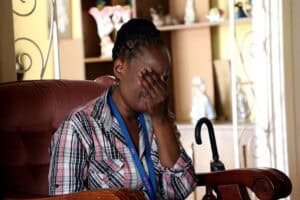Let's look at the symptoms and potential risks of shingles in pregnancy.

You may have heard that the viral infection – shingles, happens frequently in pregnancy because the virus can flare up when your immune system changes in pregnancy.
While this is partially true (the virus is linked to a compromised immune system), the good news is, shingles in pregnancy isn’t all that common, says Dr Howard Manyonga, an obstetrician and Head of The Birthing Team in Gauteng and Kwa-Zulu Natal.
Dr Manyonga says you can only get shingles if you’ve already had chickenpox. Both illnesses are caused by the same virus: the herpes varicella-zoster virus. He goes on to explain that after you recover from chickenpox, the virus stays in your body and can become active later in the form of shingles. This usually only happens if your immune system is compromised through illness, immunosuppressive drugs, severe stress, or age-related changes.
Also Read: Here are 10 quick fixes for those pregnancy aches and pains
Therefore, if you’re pregnant and have never had chickenpox or shingles, it’s a good idea to stay away from anyone who might have the herpes varicella-zoster virus, as direct contact with an active rash could pass on the virus.
Also Read: This is how Covid-19 will affect pregnancy and childbirth in the future
How to recognise the signs and symptoms of shingles
If you do contract shingles during pregnancy, it could be mild or severe and you could experience one or more of these symptoms:
- Pain down the one side of the body
- Mild or severe itching
- Patches of blisters
- A red rash that appears as a band or stripe
- Fever
- Fatigue
- Muscle weakness
This mom got shingles in her third trimester
Durban-based mom of 2, Sarah Townsend, got shingles in the third trimester of her second pregnancy. “At first I didn’t think too much of it, because my lower back and the left side of my body felt sore, which is common during pregnancy,” she explains. “However, when I started to get an itchy, painful red rash on my back and thighs, I knew there was a problem and went to my GP right away,” she says.
Sarah had a particularly difficult pregnancy with her second baby and was experiencing a lot of stress and anxiety throughout. Besides dealing with being pregnant, she was also facing financial problems and trying to juggle work and with a busy toddler at her side.. While there’s no concrete evidence to link these events with shingles, severe stress can cause the herpes varicella-zoster virus to flare up at any stage.
Also, according to a study published in Science Immunology, a woman’s immune system is continuously altered (supressed and heightened) in pregnancy to protect the foetus from an immunological attack, while still working to ward off viral or bacterial infections. These shifts and periods where the immune system is weaker, can leave you more vulnerable to infections such as shingles.
Should you be worried if you get shingles in pregnancy?
If you develop shingles when you’re pregnant, it’s usually mild and there’s no risk to you or your baby, says Dr Manyonga. “However, you should still contact your midwife or obstetrician for advice as soon as you experience symptoms and notice the rash, as you may need an antiviral treatment.”
How to treat and manage the symptoms
Unlike colds and flu, which you can take little for in pregnancy, treating shingles is safe during pregnancy. This is good news as you don’t have to endure the pain or excessive itchiness without help.
“Several antiviral medications are available to treat shingles and shorten the length and severity of the illness,” says Dr Manyonga. “These medicines are most effective when used as soon as possible after the rash appears. You can also alleviate pain symptoms with over-the-counter medication, wet compresses, or topical lotions to ease irritation,” he adds.
Also Read: All your pregnancy and covid-19 FAQs answered by Dr. Zende
More about the expert:
Dr Howard Manyonga is an obstetrician and Head of The Birthing Team, an affordable maternity programme available at Netcare Parklane in Johannesburg, Netcare Femina in Pretoria, Netcare Pholoso in Polokwane and JMH City Hospital in Durban. He has extensive local and overseas experience in the public, NGO and private health sectors, having previously headed Women’s Health at the WITS Reproductive Health and HIV Institute and was the COO of Marie Stopes South Africa. Learn more about Dr Howard Manyonga here.
Tammy is a wife, mom and freelance writer with 15 years’ experience in the media industry. She specialises in general lifestyle topics related to health, wellness and parenting. Tammy has a passion for fitness and the great outdoors. If she’s not running around after her daughter, you’ll find her off the beaten track, running, hiking or riding her bike. Learn more about Tammy Jacks .






